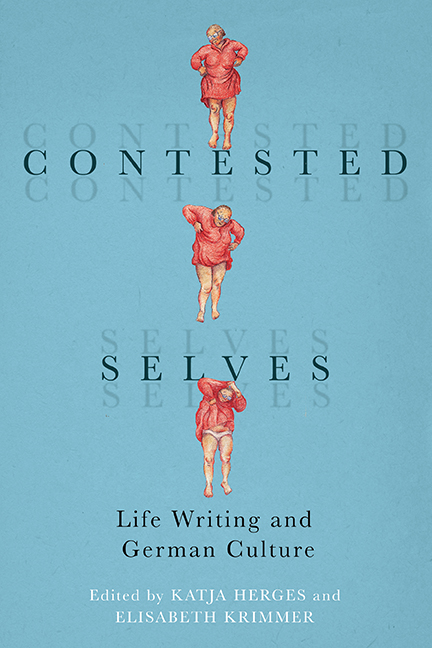Book contents
- Frontmatter
- Contents
- Acknowledgments
- Introduction
- Part I Women’s Life Writing, Female Subjectivity and Agency
- Part II Modern Life Writing and Aesthetics
- Part III Trauma and Vergangenheitsbewältigung
- Part IV Transnational and Transgenerational Life Writing in Contemporary Germany
- Bibliography
- Notes on the Contributors
- Index
1 - “A Portrait of the Moment”: Rahel Levin Varnhagen’s Letters at the Boundary of Life Writing
Published online by Cambridge University Press: 26 May 2022
- Frontmatter
- Contents
- Acknowledgments
- Introduction
- Part I Women’s Life Writing, Female Subjectivity and Agency
- Part II Modern Life Writing and Aesthetics
- Part III Trauma and Vergangenheitsbewältigung
- Part IV Transnational and Transgenerational Life Writing in Contemporary Germany
- Bibliography
- Notes on the Contributors
- Index
Summary
ON MAY 20, 1820, Rahel Levin Varnhagen (1771–1833) began a letter from Berlin to the diplomat and writer Konrad Engelbert Oelsner in Paris by writing immediately after the date, “Wenn ich mir selbst schriebe, brauchte ich weiter nichts hinzuzusetzen. Von hier aus sehe ich die Welt. Der Ort in seinem geistigen und anderm Zustande bedingt mir die Welt” (If I were writing to myself, I would need to add nothing further. From this vantage point I see the world. This place with its intellectual and other conditions determines the world for me).
It may seem paradoxical that Rahel combined the idea of seeing the whole world from a universal vantage point with the recognition that her perspective is conditioned by her intellectual and physical surroundings. Yet, in these sentences Rahel concisely summarizes the position she occupies as an epistolary writer. Although a letter writer may attempt to document life's daily occurrences in an objective manner, she can never escape the contingency of the moment of production, including location, mood, and even the deadline for posting the letter. The claim that she would not have to add anything beyond the date and location if she were writing to herself acknowledges that the intended recipient also shapes what is written: if her awareness of a correspondent did not call for further elaboration, the point of origin alone would suffice to help her recall her surroundings. In short, epistolary writing is a genre in which the tension between objective reality and subjective representation is particularly apparent and, as such, it is a form that probes the boundaries of life writing.
During the eighteenth and early nineteenth centuries, especially following the publication of Christian Fürchtegott Gellert's Briefe, nebst einer praktischen Abhandlung von dem guten Geschmack in Briefen (Letters, Together with a Practical Treatise on Good Taste in Letters) in 1751, personal correspondence was cultivated with great care and dedication. Valued for elegance of expression as well as transmission of news, personal letters were handed around and discussed in family circles and literary salons. For women in particular, letters were an easily available and socially acceptable form of writing.
- Type
- Chapter
- Information
- Contested SelvesLife Writing and German Culture, pp. 33 - 50Publisher: Boydell & BrewerPrint publication year: 2021



